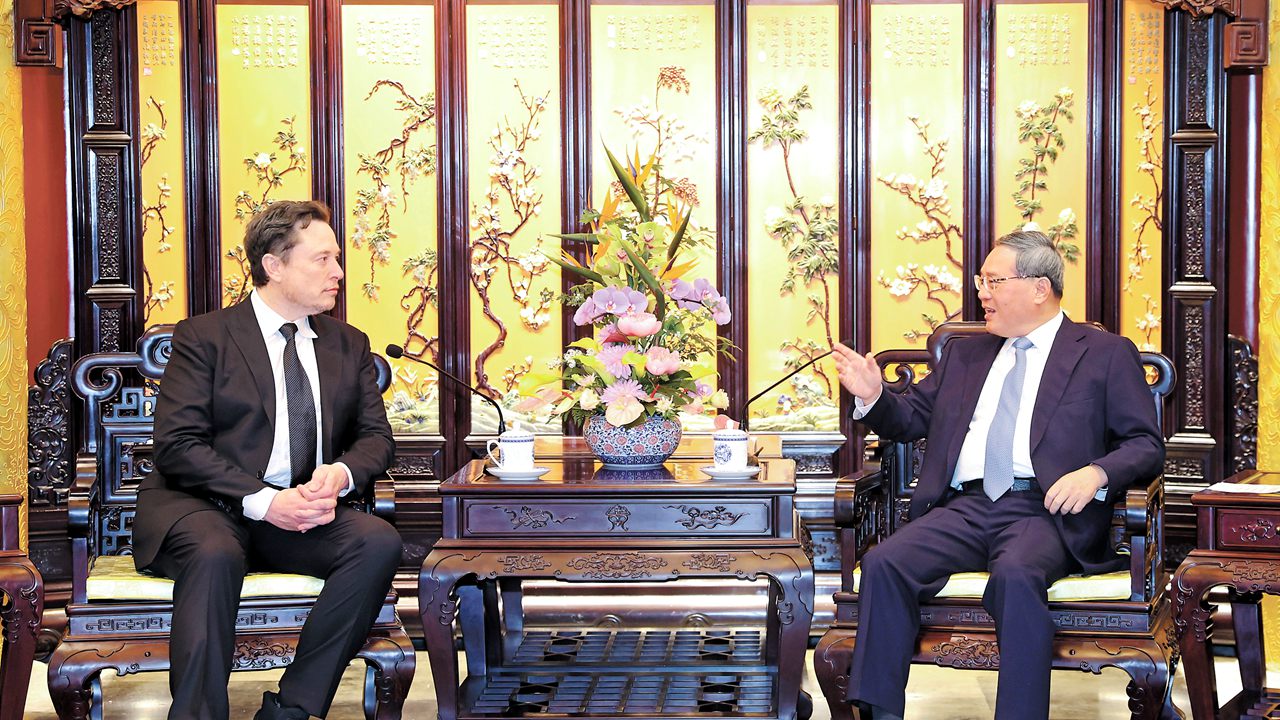Upbeat message from Cook, Musk
Writer: Lin Min | Editor: Zhang Zeling | From: Original | Updated: 2024-05-06

Tesla CEO Elon Musk (L) meets with Chinese Premier Li Qiang in Beijing on April 28. Xinhua
The global media and investors have been closely monitoring China’s economy for a while. To truly understand the trajectory of the world’s second-largest economy, it is crucial to follow the money trail instead of just relying on the rhetoric of some Western media outlets and politicians.
Corporate giants like Tim Cook and Elon Musk have recently underscored China’s significance as a major revenue driver for their companies, challenging the narrative of “divesting from China.”
During Apple’s earnings call last Thursday, Cook emphasized his optimism regarding China’s long-term prospects, stating, “I maintain a positive view of China in the long term... I don’t track every quarter or week, but over the long haul, I remain very positive.”
Despite reporting lackluster quarterly results, Cook acknowledged China as “the most competitive market in the world.” Apple’s revenue from China, although experiencing an 8.1% year-on-year decline to US$16.4 billion for the quarter, beat analysts’ expectations. Counterpoint Research had anticipated a 19.1% year-on-year drop in iPhone sales in China for the first quarter due to Huawei’s comeback in the smartphone market.
Moreover, compared to Apple’s 13% decline in China sales in the fourth quarter of 2023, the first quarter figures represented an improvement.
Musk’s unexpected visit to China and his meeting with Premier Li Qiang on April 28 conveyed a powerful message to the global business community. Just a week prior, Musk had canceled a planned trip to India and a meeting with Indian Prime Minister Narendra Modi, where discussions were anticipated regarding potential investments, including the establishment of a new Tesla factory to produce affordable vehicles.
During Musk’s visit to Beijing, the China Association of Auto Manufacturers announced that Tesla’s Model 3 and Y vehicles had met China’s data security requirements. Tesla also inked a partnership deal with Chinese tech giant Baidu to collaborate on mapping and navigation, a crucial step towards the rollout of the Full Self-Driving (FSD) system in China, deemed as “a pivotal component” for Tesla’s autonomous technology.
The progress made by Musk towards implementing Tesla’s advanced driver-assistance package in China propelled the company’s shares to surge by more than 16% April 29.
Despite facing formidable competition in China, Tesla witnessed a 15.2% year-on-year surge in first-quarter sales in the country to 159,000 units. During his meeting with Premier Li, Musk lauded Tesla’s Gigafactory in Shanghai as the company’s “best-performing” facility, and expressed willingness to deepen cooperation with China for mutual benefits.
Apple and Tesla’s perspectives encapsulate multinational corporations’ outlook on China’s economic potential. Notably, China witnessed a 20.7% increase in newly established foreign-funded enterprises in the first quarter, while foreign direct investment (FDI) remained robust at 301.67 billion yuan (US$42.46 billion).
Meanwhile, equity investors are displaying renewed optimism towards Chinese assets. Hong Kong’s Hang Seng Index surged by over 7% in April, emerging as the world’s best-performing major index. Having rebounded approximately 20% from its January low, it technically entered a bull market phase.
“Foreign inflows have begun to return with the stabilization of the [Chinese] economy,” Kelly Chung, chief investment officer for multi-assets at Value Partners, a Hong Kong-based asset management firm, told CNN.
An improving economic outlook in China, attractive valuations, and increased investments from overseas and mainland investors into Hong Kong, combined to bolster market sentiment.
Successful investors and entrepreneurs tend to disregard short-term fluctuations and setbacks. During Apple’s earnings call, Cook encouraged analysts to adopt a long-term perspective and “step back from the 90-day cycle.” He noted, “What I see is a lot of people moving into the middle class [in China]... We clearly have work there to do.”
Two best-selling smartphones in urban China are the iPhone 15 and iPhone 15 Pro Max, he added.
(The author is a deputy editor-in-chief of Shenzhen Daily.)